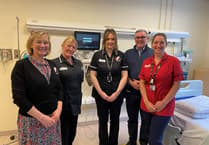The deadline is looming to apply for the island’s nursing degree.
Twenty places - 14 specialising in nursing adults and six in mental health - are available on the three-year course, which is affiliated with the University of Chester and leads to registration as a nurse.
Here, two third year student nurses, one from each field, share a typical day in their training.
Julia Furner, aged 29, is a mental health student nurse. She lives in Peel with her partner and five-year-old daughter.
Julia left school when she was 17 and started working in the finance industry.
She turned to nursing after realising she wanted to invest her time at work doing something that really mattered to her.
6am: The alarm goes off: it’s up and out of bed, quickly getting ready and grabbing some breakfast. Today I’m on an early shift at one of the island’s two mental health inpatient wards based up near Noble’s Hospital. Although the majority of mental health care takes place in the community, our inpatient units play a vital role.
6.30am: It’s an early shift so I’m on the road and ready for a busy day ahead. As well as my placement on the ward, I have a supervision session this afternoon and am conscious I really need to find some time to work on one of my assignments. All on top of normal family life.
6.55am: I arrive at work and grab a minute to quickly make a cup of tea before gathering with colleagues for a handover from the night shift. As a third year student, I have asked my mentor for the opportunity to be the ’nurse in charge’ for the day, meaning I’m responsible for the nursing staff and patients on the unit, albeit with close supervision and support. As students it’s down to us to drive our development and take responsibility for our learning. So proactively seeking out opportunities like this is expected.
7.30am: Handover complete, our night shift colleagues head home for a much needed rest. We review the patient information board and make sure we’re clear on the observations that patients need. People can be admitted to an acute inpatient ward for a number of reasons, so no two patients or their circumstances are the same. Care has to be carefully planned and tailored. Building trust and rapport with patients, getting to understand them, their problems and needs is fundamental to good mental health nursing. Getting this right is key and can help us when it comes to planning the most appropriate therapeutic approach with a patient.
7.45am: It’s time to take charge and I make sure that all of the patients have a dedicated nurse for the shift so that they can have one to one sessions. Talking is a huge part of mental health nursing. I still have my normal nursing duties to attend to though, so have my own patients to see just like the other nursing staff.
8am: Many patients are awake and up now. We encourage a routine: getting out of bed, getting ready and having breakfast. For some patients achieving the small everyday things others take for granted can be a challenge. Although everyone has their own room we encourage patients to come into communal spaces to avoid isolation and promote interaction.
9am: The doctor comes onto the ward and as nurse in charge it’s my job to update him on where each patient is at. I’m a little nervous but relish the opportunity to demonstrate the skills I’ve learned. My mentor and the doctor seem impressed - phew!
9.30am: Patients’ morning meeting. This is an opportunity for patients to plan their day and to voice any needs or concerns. All patients are encouraged to participate in morning stretches and mindfulness activities.
10 am: It’s time for medication for many of the patients - one of four drug rounds during the day. There’s strict governance and procedures around administrating these, so it takes time, needs to be carefully managed and properly recorded. We encourage patients to come and collect what they need rather than taking it to them - it’s a small but important gesture of their engagement and commitment to trying to get well.
11am: We’re holding a group therapy session on anxiety management with a number of patients in one of the lounges. We go over the theory of anxiety. Understanding the causes and normalising the situation helps patients to rationalise their condition. I lead the session but am observed by a registered nurse throughout. I’m now taking what I have learnt in the classroom and relaying it to patients. It can help them to understand their condition and empower them on their journey to manage their mental wellbeing. We also cover tips and exercises. It’s a mixed reaction but it’s important to engage as often as possible.
Noon: It’s time for lunch. The staff and patients eat together. We try to focus on positive and healthy conversations that don’t revolve around mental health and people’s specific issues. We talk about hobbies and everyday things. Eating together is an important symbol of the relationships we’re trying to foster between us as mental healthcare professionals and patients.
1pm: I’m keen to catch up with one of my patients for a one to one following a productive discussion the day before. It’s a lady who suffers from acute mental health issues which are having a debilitating effect on her life. We’re making some progress but it’s going to take time. We talk for an hour in a confidential environment. It helps to cement the rapport and trust between us. It can be difficult not to get sucked in and become burdened by someone else’s problems. Professional detachment is key but so is empathy and compassion. You can’t help but care and ultimately it’s caring that drives you on and makes you want to help people. It sits at the heart of the satisfaction I get from the role no matter how tough things get.
2pm: I leave my placement for my supervisory session. Student nurses are supernumerary so aren’t factored into the staffing levels on a ward. This gives us maximum flexibility to learn and, if needs be - like today - attend other elements of our academic work. Supervision is at Keyll Darree Education Centre, which isn’t far from my placement. It’s an important and welcome opportunity to discuss how I feel my placement in Mental Health Services is going and to reflect on my practice.
3pm: As usual, the day has flown by and it’s time to head to school to collect my daughter. Juggling life as a mum whilst in full time education can be a challenge but the satisfaction from getting to help people is its own reward and makes it worthwhile.
7pm: With dinner sorted and my daughter in bed, I head out for a run. It’s a great way to clear my head after a busy day and to keep fit, as my free time is limited.
8pm: I’m on the early shift again tomorrow and I’m looking forward to it but my attention turns to my assignments - I can’t let my studies slip. It can be a challenge to juggle the practical and theoretical side of the course but both are equally important.
For the time being I forget about my clinical placement and immerse myself in books and journals.
10pm: I stop studying, I start running through plans for tomorrow in my head. I’m looking forward to the opportunity to continue the work with my patients and progress their therapy. I reflect on the discussions I’ve had with patients today and come up with a couple of approaches to try in my next one to one.
10.30pm: Bed time.
Annabel MacLean is a student nurse in the adult field.
She is 21 and lives in the north of the island with her partner.
Her work experience in a caring home environment motivated her to give something back to the older community and she plans to work in the care home sector when she qualifies.
7.45am: Today is going to be another busy day, but I’ve been able to sleep in a little longer than usual, so wake up grateful that I’m not on an early shift. If I was on an early shift it would be a 5.30 am start before heading into placement for 7.15 am.
8.50 am: Although I don’t start my placement shift until 1pm, it doesn’t mean I have the morning to lounge around. I set off for Keyll Darree, the island’s health and social care learning centre near Noble’s Hospital. As I live in the far north of the island, having a driving licence as a student nurse is really a life saver.
9.30am: I arrive at Keyll Darree and head straight for the library. There’s a couple of books I need to check out and also some journals I want to search as I prepare for the next module assessment in my studies. As a third year our learning experience is very much independent, which means you have to have motivation and commitment to keep on track. The staff at Keyll Darree are fantastic, they can’t do enough for us and it makes a real difference, along with our small class sizes here in the Isle of Man.
10am: I’ve found what I need, so I grab a coffee from the vending machine before settling down to do some reading. It’s a modern, quiet environment with plenty of space, so I know I can knuckle down for a couple of hours uninterrupted.
Noon: Books down, I head to the staff restaurant at Noble’s Hospital to get some lunch before the start of my shift. I’ve arranged to meet up with a few of my fellow students. Three years in, we’re all close and treat each other like family. It is important to reflect on our practice as a student nurse and therefore, having friends who are also student nurses helps with any stress or nerves.
1.15pm: It’s out of the locker room, uniform donned and off to Ward 12. Switching from academic to practical nursing mode is something you quickly get used to. In your first year you can be on a placement in a ward within 12 weeks of starting the course - but you are always fully supervised and supported, not only by your assigned mentor but the whole team of health professionals.
1.30pm: It’s time for the handover from the early shift. Although late shifts are sometimes quieter than an early shift a hospital ward runs 24 hours a day, so things never stand still. Ward 12 is an elective orthopaedic ward for people coming in for hip and knee replacement surgery etc. Handover is a vital part of nursing communication, as a student nurse it is a skill you are always developing. I will always remember when I was told to hand over an entire bay of patients to a full room of nurses and health care assistants. In my head I was thinking ’What were the orders from the Dr for Mr X in bed 3?’, ’How many patients are even on the ward?’. It can be nerve racking, as you’re put on the spot, but like learning to drive - you eventually get it.
2pm: Although I’ve decided I want to work in a nursing home when I graduate, I’m enjoying getting to experience life in a surgical ward. You quickly learn to transfer skills you have acquired from one placement to the next. Today should be quite interesting as I’ve requested to witness a surgical procedure - a gentleman who is coming in for a hip replacement.
2.30pm: I’ve been allocated two patients to be responsible for, although my mentor always keeps a close eye on me - we effectively shadow qualified nurses. One of my patients is a lady who had a knee replacement two days ago. As I’ve been on duty all week, I have got to know her, so we have a good rapport. You never forget each patient is an individual with different needs and circumstances.
3pm: I’ve spent a good while with the lady who had the knee replacement, checking how she is and what she wants to achieve today. I’m glad to see she’s out of bed and sitting in her chair. The nursing team on the morning shift have ensured she is washed and ready for the day, another important part of our job. Nurses aren’t ’too posh to wash’.
Our place is by the bedside and it’s a privilege to care for patients and do small things that improve their experience of being in hospital. I review her notes: what medication she’s had and when it’s next due; I ask her what level of pain she has and take observations such as her blood pressure and breathing rate.
It’s important for orthopaedic patients to be mobilised as soon as possible after surgery, even though this may seem counter-intuitive. Today she’ll be visited by a physiotherapist to continue her rehabilitation as well as an occupational therapist to continue our planning for when she is able to go home.
The surgeon will also be visiting later to check on her progress. Planning for discharge begins as soon as someone is admitted. We want people to have as short a stay as possible and get back to their normal life quickly, albeit with the right package of support to help them.
3.15pm: My other patient was admitted this morning. He’s having the hip replacement I’ll witness shortly. The morning team prepped his bed and went through his admission assessment. I’ve been keeping him comfortable and checking he’s OK, it’s obviously an anxious time for people just before surgery.
Even though he spoke with the surgeon earlier, questions continue to pop into people’s heads right up until the procedure. What becomes routine for health professionals can be very unnerving and intimidating for patients. We always remember this, putting ourselves in the patient’s shoes and seeing things from their perspective.
3.30pm: I’ve headed down to theatre with the patient who is now under anaesthetic. It’s a different experience being in theatre. The procedure could last up to two hours. There’s going to be lots to take in and I’m sure I’ll have many questions afterwards.
I have found having a small pocket book and pen to write down questions, is invaluable.
5pm: We’re heading back to the ward, the operation has been completed successfully. You quickly learn not to be squeamish as a nurse, but it was eye opening watching surgery take place. It helps you to better understand the patient’s journey from surgery through to healing and rehabilitation and you get a better sense for the pain and discomfort patients find themselves in after surgery.
5.30pm: I get the chance to grab a sandwich and a cup of tea. I quickly check my emails as my mind turns back to my studies. I’ve had a message from one of the teaching staff who runs one of the two skills labs. She’s confirmed a slot for tomorrow morning as I want to pop in and go over my manual blood pressure skills again. We have brilliant facilities - our skills labs are mock ward environments where we can practise and hone our skills from taking blood to running an entire hospital ward.
5.45 pm: It’s back to the ward. I’ve a while to go yet before home but I’m more concerned with my new patient and to begin our work to get him on the road to recovery.
As a student nurse I am never bored, I still think there is so much more to learn and I have taken so much knowledge and skill development from each placement from surgical to medical, intensive care to community nursing and cannot see myself in any other career.
â?¢ The deadline to apply is Friday. Apply online at www.gov.im/nursetraining




